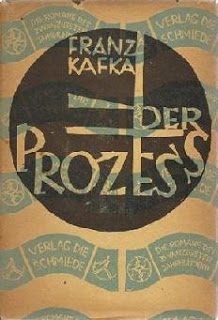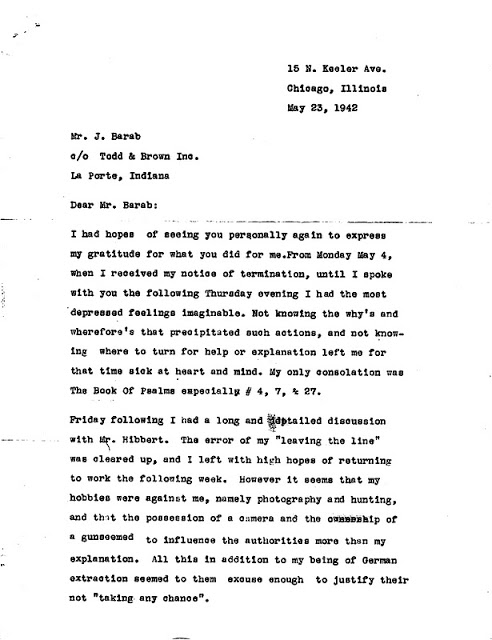
Der Prozess, The Trial by Franz Kafka
The last two posts have detailed the anti-German bigotry my father faced in his work at the Kingsbury Ordnance Plant in La Porte, Indiana, where he had begun work on March 30, 1942, as a blasting powder blender.
Similar to the character, Josef K. in Kafka’s novel, The Trial, (Der Prozess) who is arrested, but never told why nor who ordered the arrest, my father was summarily fired on May 4th from his job as a blasting powder blender, but no one could tell him why nor who was responsible. Normally non-confrontational by nature, Dad refused to abide this travesty, and doggedly pursued an answer, which boiled down to this: he crossed his sevens, he made his cursive “F” with a flourish the company deemed “too German,” and of course, his parents were ethnic Germans––but the family actually hailed from Transylvania (now Romania), not Germany, and had since 1770.
After an intense grilling by the personnel director, Mr. Hibbert, (“I had to answer 1,000 questions and my life was chopped into tiny pieces,” Fred wrote), Mr. Hibbert said he was satisfied, and Dad had high hopes to return to work. But alas, it was not to be. Apparently he had two very “un-American” hobbies, as you’ll see in the letter below.
Fred wrote the following letter to Mr. Barab, the man who had been given the order to fire Fred with no explanation, but later, after Fred tracked Barab down at his home, arranged for Fred to have meet with Hibbert. Under the circumstances, I find this letter to be extraordinarily gracious.

Fred ends the letter saying he couldn’t have left Indiana until he had received an honest explanation of the reasons he was fired and the chance to clear his and his family’s name. He thanks Barab for making the meeting with the assistant personnel director, Hibbert, possible so he, Fred, could finally get a straight answer. Fred then asked if he may use Barab as a reference. Hibbert allowed him (Fred) to resign voluntarily so that Fred’s opportunities for future employment , weren’t jeopardized. Hibbert, too, promised to give Fred good references. In the end, however, Fred still lost the job, even after the lies and suspicions proved unfounded. An employee who enjoyed hunting and taking photos was just too great a risk! No qualms existed, however, a few months hence, in drafting Fred’s younger brother to fight in the war.
It’s not surprising that a country becomes more paranoid during wartime, but this trip into my father’s past has reminded me that we must be on-guard not to let bigotry deny our fellow Americans whatever their ethnic heritage, and even our foreign neighbors, fairness and due course of justice.
Next week we’ll return to Fred and Lil’s romance, this time with a tongue-in-cheek letter Fred sent to Lil seventy years ago, on January 27, 1942. It’s a “scientific analysis” of the two of them a “hitherto unclassified biological species!”


thanks for this series of posts, Linda. It shows how paranoia can take hold and mis-interpret every action however innocent. I have German ancestry myself and it makes me very sad that my 2x great grandfather’s life in Australia came to an end during ww1 with his former countrymen vilified in all ways possible. He’d been here 50 years but no doubt there were those wiling to believe him dangerous even at 80+. He had the advantage of being Catholic and married to an Irish woman so it mitigated his German-ness. However the experiences of my ancestors very much determine… Read more »
History repeats itself, just try to build a mosque in the Chicago area. I am proud that my grandparents (German on both sides) weathered this type of bigotry and send several of their sons to serve in WWII.
Interesting. It never occurred to me that my German ancestors who lived in Wisconsin during WWII might have faced discrimination due to their very German last name (Muermann). They were only second generation U.S. citizens then.
Linda, this brief series of your posts solidifies my belief in the great importance of knowing history for ourselves–not any revisionist’s rewrite or even any benign errors of omission in the “official” record. This experience of your father was an example of a major issue in the lives of many that I have amazingly been unaware of until your posts!
I was anticipating this post and had already concluded that Fred was going to lose his job — but I never anticipated that it would be because of his hobbies, especially photography. Waiting for the next post. It sounds intriguing.
Thank you, everyone, for your heartfelt comments. Sorry for the delay in responding. I was out of town and my computer failed me. Fixed today. Pauleen, sounds like your family had its share of prejudice to contend with as well. Marian, I took away the same sense of history repeating itself. Abigail, perhaps the bigotry wasn’t as bad if you weren’t working in an ordnance factory, and Jacqi–thanks for letting me know you gained something from these posts. I think we all learn from each other. Kathy, you always seem to figure out what’s to come!